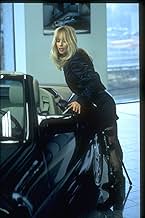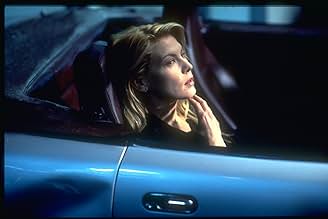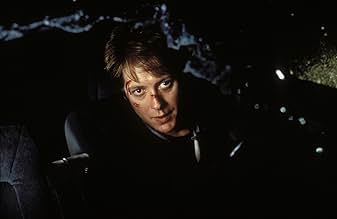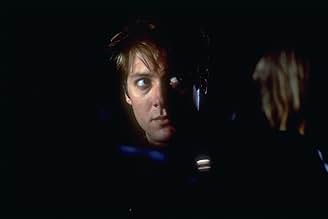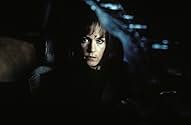A car crash victim suddenly finds himself turned on by car accidents and becomes involved with an underground sub-culture of like-minded souls.A car crash victim suddenly finds himself turned on by car accidents and becomes involved with an underground sub-culture of like-minded souls.A car crash victim suddenly finds himself turned on by car accidents and becomes involved with an underground sub-culture of like-minded souls.
- Director
- Writers
- Stars
- Awards
- 9 wins & 6 nominations total
Deborah Kara Unger
- Catherine Ballard
- (as Deborah Unger)
David Cronenberg
- Auto Wreck Salesman
- (voice)
- (uncredited)
Jordan-Patrick Marcantonio
- Man in Tattoo Parlor
- (uncredited)
- Director
- Writers
- All cast & crew
- Production, box office & more at IMDbPro
Featured reviews
James Ballard, a TV director who is going through a complicated phase at a professional and personal level, suffers a car accident that transports him to an urban sub-culture, where victims of car accidents have sex in order to rejuvenate and give meaning to their lives.
It's a bizarre film, at least, dark, psychologically disturbing, and uncomfortable, for the vast majority of the audience.
This film explores certain psychological changes that a person may suffer after a trauma, instincts and ingrained desires, which needed the right moment to emerge.
The characters are cold, lacking a solid background, disconnected from emotions, which are linked only by carnal attraction and the primitive and violent sexual desire.
It's a metaphor about our relationship with technology and the progressive loss of connections with other individuals, but I don't think it had the best execution.
It's a bizarre film, at least, dark, psychologically disturbing, and uncomfortable, for the vast majority of the audience.
This film explores certain psychological changes that a person may suffer after a trauma, instincts and ingrained desires, which needed the right moment to emerge.
The characters are cold, lacking a solid background, disconnected from emotions, which are linked only by carnal attraction and the primitive and violent sexual desire.
It's a metaphor about our relationship with technology and the progressive loss of connections with other individuals, but I don't think it had the best execution.
Crash is a very sexually explicit film, but if you buy or rent this movie expecting it to be an evening's erotic entertainment, you are going to be disappointed, because it is also an anti-erotic film.
Even in the midst of frenzied lovemaking, the characters remain distant, their voices quiet and abstracted, their gazes directed inward. These are people who have been told all their lives by their culture, by TV and movies, that sex is, on the one hand, the most perfect form of communion and connection with another human being; and, on the other hand, that it is the ultimate in transcendent and transformative experiences. Instead, they discover to their horror that even during sex they still feel nothing. They crave connection, they are starved for a glimpse of transcendence, but no matter what they do, no matter who they do it with or how often, while their bodies may feel passion, their minds and hearts remain cold and empty.
In the more recent movie Pleasantville, the Jennifer/Mary Sue character is unable to feel anything either, and remains stubbornly black and white no matter how much sex she has, until her brother suggests that "maybe it isn't the sex" that is the key to moving from black and white to color, from passionlessness to feeling. Unfortunately, in Crash, there is no one to suggest to David and Catherine Ballard that maybe it isn't through sex that they will find the transformation and connection they are craving. So they instead seek more and more extreme forms of sexual stimulation, only to be disappointed again and again.
James is hurt in a car crash, and during his stay in the hospital he meets Helen (who was in the other car) and later Vaughan, a man who like James and Catherine is in desperate search of feeling, only he looks for it in the violence of car crashes. With Helen, at first James, then Catherine too is drawn into Vaughan's world, where sex and death (eros and thanatos for you Freudians) meet in the twisted metal of wrecked cars and the mutilated bodies of the victims of fatal car crashes and the survivors of near-fatal ones.
They attend staged recreations of famous car crashes, like the one that killed James Dean. They have sex in crashed cars, and start touring crash sites on the freeway as a form of foreplay. They begin to watch films of crash tests and fatal race accidents like other people would watch erotic films, and to have sex with people whose bodies have been mutilated by car crashes.
But not even the horror of mutilation or the adrenaline rush of near-death experience can lend James and Catherine's desperate coupling the depth of feeling that they so desperately crave.
Like all the people who buy expensive automobiles to give them a feeling of power and independence, only to discover that no matter how snazzy their car is, they still feel powerless and unhappy, James and Catherine have bought into one of our culture's Big Lies, that sex is the answer. This film shows us that it is not.
Even in the midst of frenzied lovemaking, the characters remain distant, their voices quiet and abstracted, their gazes directed inward. These are people who have been told all their lives by their culture, by TV and movies, that sex is, on the one hand, the most perfect form of communion and connection with another human being; and, on the other hand, that it is the ultimate in transcendent and transformative experiences. Instead, they discover to their horror that even during sex they still feel nothing. They crave connection, they are starved for a glimpse of transcendence, but no matter what they do, no matter who they do it with or how often, while their bodies may feel passion, their minds and hearts remain cold and empty.
In the more recent movie Pleasantville, the Jennifer/Mary Sue character is unable to feel anything either, and remains stubbornly black and white no matter how much sex she has, until her brother suggests that "maybe it isn't the sex" that is the key to moving from black and white to color, from passionlessness to feeling. Unfortunately, in Crash, there is no one to suggest to David and Catherine Ballard that maybe it isn't through sex that they will find the transformation and connection they are craving. So they instead seek more and more extreme forms of sexual stimulation, only to be disappointed again and again.
James is hurt in a car crash, and during his stay in the hospital he meets Helen (who was in the other car) and later Vaughan, a man who like James and Catherine is in desperate search of feeling, only he looks for it in the violence of car crashes. With Helen, at first James, then Catherine too is drawn into Vaughan's world, where sex and death (eros and thanatos for you Freudians) meet in the twisted metal of wrecked cars and the mutilated bodies of the victims of fatal car crashes and the survivors of near-fatal ones.
They attend staged recreations of famous car crashes, like the one that killed James Dean. They have sex in crashed cars, and start touring crash sites on the freeway as a form of foreplay. They begin to watch films of crash tests and fatal race accidents like other people would watch erotic films, and to have sex with people whose bodies have been mutilated by car crashes.
But not even the horror of mutilation or the adrenaline rush of near-death experience can lend James and Catherine's desperate coupling the depth of feeling that they so desperately crave.
Like all the people who buy expensive automobiles to give them a feeling of power and independence, only to discover that no matter how snazzy their car is, they still feel powerless and unhappy, James and Catherine have bought into one of our culture's Big Lies, that sex is the answer. This film shows us that it is not.
I love this film. I have now viewed it three times and I still keep getting something new out of each viewing.
I think it's one of Cronenberg's best. It is not, however, for the uninitiated. By that, I mean those who are not familiar with Cronenberg's previous work, and those who have not read J.G. Ballard, whose novel was the basis for this film.
Cronenberg excels at bringing difficult pieces of fiction to film. This is one such example.
The written works of J.G.Ballard are generally, dark, dreary, and disturbing psychological fiction. The characters in them are often very disturbed and socially dysfunctional. These are people who, often due to unusual circumstances, are not in their right minds.
In Crash, we are observing a group of characters who are all survivors of horrific car crashes. Like many crash survivors, they are, during their period of recovery, in shock. They are badly shaken. They are recovering from severe physical injuries, and they are disoriented, fearful, and emotionally numb.
Instead of recovering in the normal fashion, (how sad that we've come to think of auto accidents as normal) these characters stumble into the car crash cult of Vaughan. Vaughan, who is brilliantly portrayed by Elias Koteas, is a scientist who believes that there is a strong connection between the violence of a car crash and the passion of the sexual act.
He easily indoctrinates the other characters into his mode of behavior and beliefs. By staging car crashes for entertainment, by initiating traffic altercations with his followers and ultimately finishing with some very warped sex, usually involving cars, there is a metaphor being created. Accidents, and the viewing of them becomes foreplay. It's the eroticism of the automobile taken to an extreme.
Our society has had, what is often referred to as a "love affair" with the automobile. This love affair has resulted in a worldwide addiction to a means of transportation that is, in reality, often very unhealthy and destructive. Aside from the aftermath of pollution and the sheer carnage of the ever rising highway accident rate, this addiction also increases people's isolation from each other. Hidden in their private shells, they move about, only interacting with one another as necessary. This interaction rarely becomes intimate until it is violent, as in aggressive driving and accidents .
In Crash, the characters are all portrayed as cold hearted, numb, and incapable of true intimacy with each other(they sure have a lot of sex though). They are only capable of intimacy through their cars.
This film is a bizarre metaphor for the human condition and how it is affected by our choice of technology. It is not meant to make car crashes look sexy. It is meant to draw attention to how our most familiar technology has changed us and made us less human.
I love this film. Brilliant cast. Great cinematography. An excellent soundtrack by Howard Shore (multiple layers of cleanly played, very dissonant electric guitar, sounding like a cross between Sonic Youth and Brian Ruryk). Only Cronenberg would have the guts to tackle a subject as difficult as this particular work of Ballard's. I think he did quite well.
Depending on your mood at the time of viewing, this film can range from being shocking, amusing, revolting, hilarious, to even just plain boring. It's a great piece of art, but you really do have to be in the right mood for it.
I think it's one of Cronenberg's best. It is not, however, for the uninitiated. By that, I mean those who are not familiar with Cronenberg's previous work, and those who have not read J.G. Ballard, whose novel was the basis for this film.
Cronenberg excels at bringing difficult pieces of fiction to film. This is one such example.
The written works of J.G.Ballard are generally, dark, dreary, and disturbing psychological fiction. The characters in them are often very disturbed and socially dysfunctional. These are people who, often due to unusual circumstances, are not in their right minds.
In Crash, we are observing a group of characters who are all survivors of horrific car crashes. Like many crash survivors, they are, during their period of recovery, in shock. They are badly shaken. They are recovering from severe physical injuries, and they are disoriented, fearful, and emotionally numb.
Instead of recovering in the normal fashion, (how sad that we've come to think of auto accidents as normal) these characters stumble into the car crash cult of Vaughan. Vaughan, who is brilliantly portrayed by Elias Koteas, is a scientist who believes that there is a strong connection between the violence of a car crash and the passion of the sexual act.
He easily indoctrinates the other characters into his mode of behavior and beliefs. By staging car crashes for entertainment, by initiating traffic altercations with his followers and ultimately finishing with some very warped sex, usually involving cars, there is a metaphor being created. Accidents, and the viewing of them becomes foreplay. It's the eroticism of the automobile taken to an extreme.
Our society has had, what is often referred to as a "love affair" with the automobile. This love affair has resulted in a worldwide addiction to a means of transportation that is, in reality, often very unhealthy and destructive. Aside from the aftermath of pollution and the sheer carnage of the ever rising highway accident rate, this addiction also increases people's isolation from each other. Hidden in their private shells, they move about, only interacting with one another as necessary. This interaction rarely becomes intimate until it is violent, as in aggressive driving and accidents .
In Crash, the characters are all portrayed as cold hearted, numb, and incapable of true intimacy with each other(they sure have a lot of sex though). They are only capable of intimacy through their cars.
This film is a bizarre metaphor for the human condition and how it is affected by our choice of technology. It is not meant to make car crashes look sexy. It is meant to draw attention to how our most familiar technology has changed us and made us less human.
I love this film. Brilliant cast. Great cinematography. An excellent soundtrack by Howard Shore (multiple layers of cleanly played, very dissonant electric guitar, sounding like a cross between Sonic Youth and Brian Ruryk). Only Cronenberg would have the guts to tackle a subject as difficult as this particular work of Ballard's. I think he did quite well.
Depending on your mood at the time of viewing, this film can range from being shocking, amusing, revolting, hilarious, to even just plain boring. It's a great piece of art, but you really do have to be in the right mood for it.
A detailed, dark, wild sexual fantasy of Cronenberg.
Fantasizing & getting turned on by car accidents is pretty darn dark.
Crash caused a huge stir in the United Kingdom. Many conservatives were outraged by the combination of sex, already an issue of danger because of aids, and traffic accidents. Dangerous driving is like smoking, a subject that you just can't touch without many moral watchdogs chasing you through a hellish puritan junkyard.
I remember seeing this and a middle aged to elderly man in the theater began to quite obviously...ahem...trouser cough. This was one hell of a way to clear the cinema! That moment is pretty much like this film. Crash has weird sex and masterbation, stuff that you do not really want to see. But David Cronenberg with the help of James Ballard drags us into a world that just takes the whole 'I love cars' boy racer thing way too far! It is just not healthy...
Ballard writes in a bleak monotone. A monotone that Chuck Palahniuk seeks to imitate unsuccessfully. All of his characters are alien because of their lack of emotion. Cronenberg takes this aspect and runs with it. This makes the film good not because of the familiarity and sympathy that the viewer can build with the characters. It is actually quite the opposite, the film strikes the viewer because of the sheer UNREALITY of what is happening. The complete and utter icy way that everything is presented just leaves the viewer going 'what?' Am I watching a bunch of jellyfish here? The characters are so jaded. Trying desperately to experience emotion in an industrialized emotionless world. A world that has become nothing more than a production line. Good Ford! Sorry, Huxley joke. Nerdy but necessary.
Also, Cronenberg is presenting a discourse that the famous intellectual Donna Haraway puts forward. That basically the human race has become cyborgs. The the human form is constantly changing. That machines are changing our humanity and crash seems to say that our own sexuality can mingle with the mundane machines that we hold so dear. Oh no! I am getting flashbacks of the crazed artist Stellarc...no...no...no! Besides I bet in the future, terminators would make much more money as sexual partners, rather than as assassins. Imagine that, a beautiful spouse who always thinks your right and never argues with you. I LOVE THE FUTURE!
Sex is considered to be the ultimate joining of two people. The most intimate way that human beings can connect to one another. Wrong! This film suggests that sex means...well, nothing really. Procreation and a simple physical reaction. This is shown by James Spader and his wife's, Deborah Unger, relationship. These two are so jaded they tell each other their sexual adventures for attempted excitement but feel absolutely nothing. Certainly not some sought of emotional closeness to one another.
This film is just so incredibly empty. But it is also a comment on the human condition. How we make almost suicidal attempts to attain pleasure. If this was a film about heroin for instance, about junkies, this film would be much more understandable. Ballard has taken this addictive, self destructive behaviour and replaced it with an everyday object. The motor car. It is a brilliantly simple idea! But look at how many people it has horrified and offended! C'mon people, are we really this stupid? Sex and drugs, sex and violence. Sex, drugs and violence. These things are all o.k. Portrayed constantly in Hollywood movies. Van Diesel anybody? But sex and car accidents, how dare you? What kind of a sick freak are you??!! Consider how hypocritical this is when you watch something like Fast and the Furious.
This is also a film that features the psychological nature of fetish heavily. Instead of having the common fetish for breasts or bottoms, which again people might find more understandable. The fetish is actually for wounds and crash test dummy videos! That scene with Rosanna Arquette, ewww! Would that work? This is definitely something that no one should try at home.
David Cronenberg really deserves credit for making this film. He really has some big balls and respects the intelligence of the audience, which I however do not. All of the actors deserve much credit for taking on some truly difficult material. They must really trust the director. I'm surprised no one said 'no David, you are out to lunch on this one!' This film could have become a parody so easily. Never have I seen a film where everyone in the audience seemed so uncomfortable with the material. In fact, when I saw this film without the trouser coughing, people still walked out. It hasn't been since Salo that I have see a movie upset so many people. I give this 8 out of 10 for sheer weirdness. A great moment in a major auteur's career who is not afraid to take risks. Hollywood take note!
I remember seeing this and a middle aged to elderly man in the theater began to quite obviously...ahem...trouser cough. This was one hell of a way to clear the cinema! That moment is pretty much like this film. Crash has weird sex and masterbation, stuff that you do not really want to see. But David Cronenberg with the help of James Ballard drags us into a world that just takes the whole 'I love cars' boy racer thing way too far! It is just not healthy...
Ballard writes in a bleak monotone. A monotone that Chuck Palahniuk seeks to imitate unsuccessfully. All of his characters are alien because of their lack of emotion. Cronenberg takes this aspect and runs with it. This makes the film good not because of the familiarity and sympathy that the viewer can build with the characters. It is actually quite the opposite, the film strikes the viewer because of the sheer UNREALITY of what is happening. The complete and utter icy way that everything is presented just leaves the viewer going 'what?' Am I watching a bunch of jellyfish here? The characters are so jaded. Trying desperately to experience emotion in an industrialized emotionless world. A world that has become nothing more than a production line. Good Ford! Sorry, Huxley joke. Nerdy but necessary.
Also, Cronenberg is presenting a discourse that the famous intellectual Donna Haraway puts forward. That basically the human race has become cyborgs. The the human form is constantly changing. That machines are changing our humanity and crash seems to say that our own sexuality can mingle with the mundane machines that we hold so dear. Oh no! I am getting flashbacks of the crazed artist Stellarc...no...no...no! Besides I bet in the future, terminators would make much more money as sexual partners, rather than as assassins. Imagine that, a beautiful spouse who always thinks your right and never argues with you. I LOVE THE FUTURE!
Sex is considered to be the ultimate joining of two people. The most intimate way that human beings can connect to one another. Wrong! This film suggests that sex means...well, nothing really. Procreation and a simple physical reaction. This is shown by James Spader and his wife's, Deborah Unger, relationship. These two are so jaded they tell each other their sexual adventures for attempted excitement but feel absolutely nothing. Certainly not some sought of emotional closeness to one another.
This film is just so incredibly empty. But it is also a comment on the human condition. How we make almost suicidal attempts to attain pleasure. If this was a film about heroin for instance, about junkies, this film would be much more understandable. Ballard has taken this addictive, self destructive behaviour and replaced it with an everyday object. The motor car. It is a brilliantly simple idea! But look at how many people it has horrified and offended! C'mon people, are we really this stupid? Sex and drugs, sex and violence. Sex, drugs and violence. These things are all o.k. Portrayed constantly in Hollywood movies. Van Diesel anybody? But sex and car accidents, how dare you? What kind of a sick freak are you??!! Consider how hypocritical this is when you watch something like Fast and the Furious.
This is also a film that features the psychological nature of fetish heavily. Instead of having the common fetish for breasts or bottoms, which again people might find more understandable. The fetish is actually for wounds and crash test dummy videos! That scene with Rosanna Arquette, ewww! Would that work? This is definitely something that no one should try at home.
David Cronenberg really deserves credit for making this film. He really has some big balls and respects the intelligence of the audience, which I however do not. All of the actors deserve much credit for taking on some truly difficult material. They must really trust the director. I'm surprised no one said 'no David, you are out to lunch on this one!' This film could have become a parody so easily. Never have I seen a film where everyone in the audience seemed so uncomfortable with the material. In fact, when I saw this film without the trouser coughing, people still walked out. It hasn't been since Salo that I have see a movie upset so many people. I give this 8 out of 10 for sheer weirdness. A great moment in a major auteur's career who is not afraid to take risks. Hollywood take note!
Did you know
- TriviaSex scenes between James Ballard and his secretary were filmed but cut because director David Cronenberg felt the actors' chemistry was too good, contravening the nature of all the other relationships in the film.
- GoofsAfter Vaughan repeatedly crashes the left front bumper of his Lincoln into a junker James Ballard is sitting in, causing major damage to the bumper and the lights, Vaughan is soon shown driving on the highway with no damage to the bumper and both left lights operational.
- Quotes
[Last lines]
James Ballard: Katherine, are you all right?
Catherine Ballard: James. I don't know.
James Ballard: Are you Hurt?
Catherine Ballard: I think I'm all right...
[James starts groping and kissing her]
Catherine Ballard: ... I think I'm all right.
James Ballard: Maybe the next time, darling. Maybe the next time.
- Alternate versionsAccording to Issue 58 of Film Ireland magazine, the Irish censors imposed 35s worth of dialogue cuts on the cinema release - this affected the sex scene where Catherine fantasizes about Vaughn to James. It's speculated this was actually done not due to the content, but to dissuade the distributors from submitting the uncut version on video (which could cause controversy in a less restricted environment) - however, all video releases are uncut and still rated 18.
- ConnectionsFeatured in Late Review: Censorship and Cronenberg 's Crash (1996)
Details
- Release date
- Countries of origin
- Languages
- Also known as
- Crash: Extraños placeres
- Filming locations
- Production companies
- See more company credits at IMDbPro
Box office
- Budget
- $9,000,000 (estimated)
- Gross US & Canada
- $2,664,812
- Opening weekend US & Canada
- $738,339
- Oct 6, 1996
- Gross worldwide
- $2,678,631
- Runtime
- 1h 40m(100 min)
- Color
- Sound mix
Contribute to this page
Suggest an edit or add missing content


